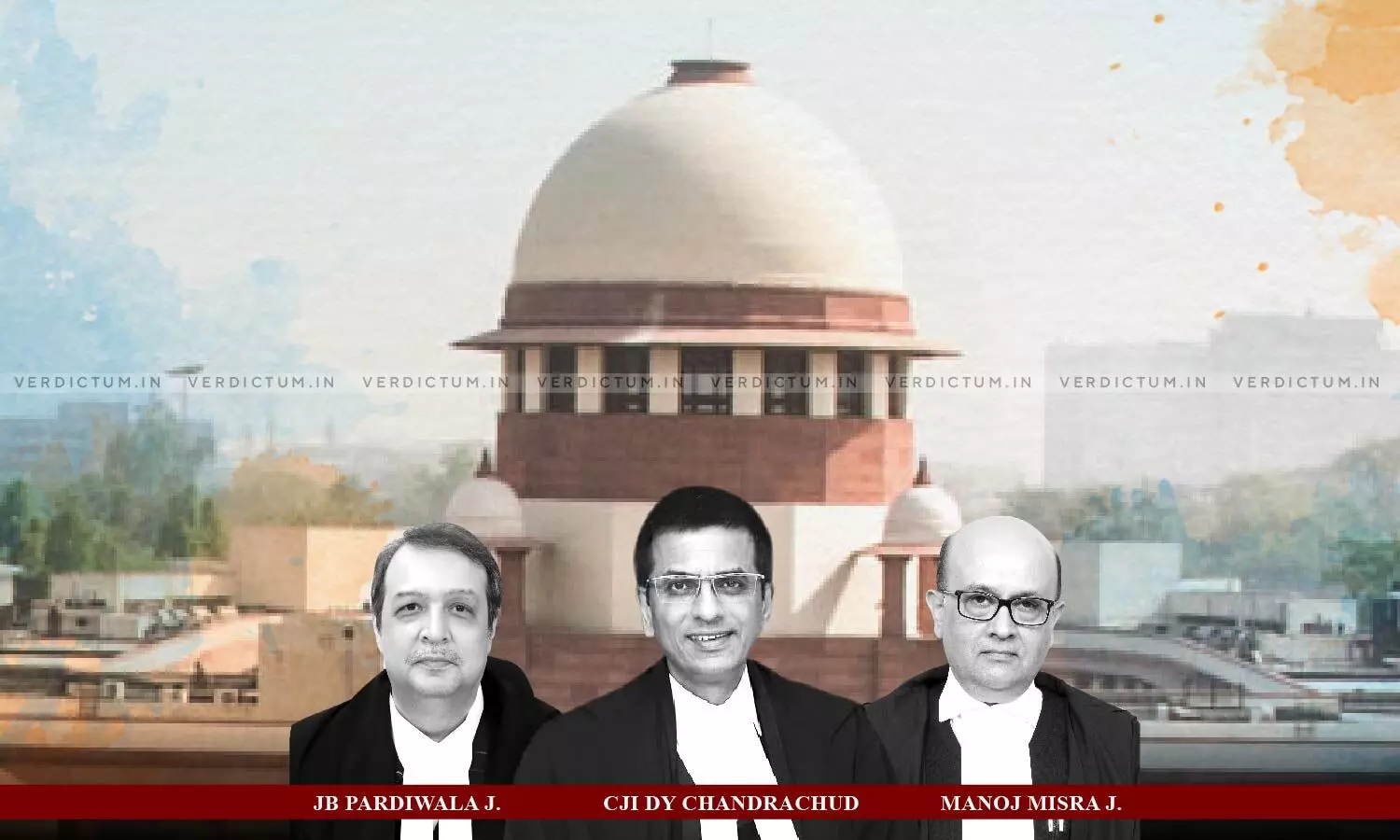
Laudable Concern But Can't Have One Size Fits All Approach: Apex Court While Disposing Of PIL Seeking Page Limit For Petitions
 |
|The Supreme Court today disposed of a Public Interest Litigation filed under Article 32 of the Constitution seeking formulation of appropriate rules or guidelines for limiting the number of pages in petitions, plaints, and submissions filed before Courts. Likewise, the PIL also sought restrictions on the annexing voluminous documents or judgements as annexures to pleas before Courts.
The Bench of Chief Justice D.Y. Chandrachud, Justice J.B. Pardiwala and Justice Manoj Misra at the outset remarked, "How can we say in all matters that there should be a word limit or page limit on written submissions? On the one hand, if the Constituion Bench is hearing Article 370 cases and then you have a Petition under the Consumer Protection Act, can we say that you should not have filed written submission beyond 10 pages?"
The PIL filed by Amrish Rajnikant Kilachand through the Advocate-on-Record Mohini Priya states that the umpteen number and volume of cases filed every year is one of the biggest problems being faced today by Courts, creating a burden on the Court and its staff. According to the petitioner, the same is due to the lack of any specific rule or guideline defining a page limit for petitions filed before the Court. The PIL also highlighted that many countries including the United States of America have specific rules that set limits on the maximum number of words that can be used in written submissions, the maximum number of pages that written submissions can extend up to, and so on.
Taking into account the merits of the case, the CJI expressed, "American Supreme Court jurisdiction is very different from our jurisdiction, we are a Court of Appeal and a Constitutional Court." In response, Mohini Priya submitted that the concern is about access to justice and requested the Court if the issue could be considered on the administrative side.
Commenting on the issue, the CJI added, "Share your suggestions on how to structure it most effectively... We're already taking steps in that direction. We have introduced nodal counsels who are tasked with preparing digital copies of the entire compilation. Additionally, we have decided against accepting written submissions after the commencement of the hearing. We are progressing, but a one-size-fits-all approach won't suffice."
Urging the Court to deliberate on the issue, Mohini Priya further submitted, "Lordships have been emphasising the need of having a limit on oral and written submissions. This is just an attempt in that direction to secure better access to justice and save precious judicial time. Kindly consider this on the administrative side." On a lighter note, Justice Pardiwala quipped, "Now, someone is also thinking about the Judges." Echoing Justice Pardiwala's sentiment, the CJI chimed in, "Because people will file big voluminous records and we have to sit down and read them."
Accordingly, the Bench in its order noted, "While the concern of Petitioner in setting out the need for page limits on Petition in Court is laudable, it might be difficult for the Court to give 'one size fits all' directions of this nature. However, if the Petitioner has any concrete suggestion on the administrative side to facilitate expedition in the disposal of the case, he is at liberty to place a representation before the Secretary-General. This will however not give rise to any fresh cause of action. Subject to aforesaid, the Petition is disposed of."
In PIL, the petitioner had submitted that according to the facts stated by the then Law Minister of India Kiren Rijiju on December 31, 2022, the total pending cases in district and subordinate courts was over 4.32 crore. He also stated the existence of over 69,000 cases pending in the Supreme Court and a backlog of more than 59 lakh cases in the country's 25 high courts. The numbers are truly alarming and point towards a serious problem of judicial pendency.
"The lack of rules/guidelines with regards to the length of petitions/ written submissions in Indian Courts acts as a major contributor to wastage of judicial time and lapse in speedy disposal of cases", read the PIL. It was also contended that creating such page limits would help in putting the judicial system of India in line with the multiple judicial systems of the world such as that of the United States of America and the United Kingdom which have successfully implemented the same.
"That limiting the number of pages in a petition would ensure that the facts and laws are presented in an organised and concise manner, easing the court’s decision-making process, reducing the burden on the court staff, ensuring discussion on the key issues and questions as well as encouraging environment sustainability by saving paper", it is contended in the PIL.
It also says that imposing such a limit would result in immense cost savings for the Court, due to the reduction in time required for getting through lengthy paperwork, producing each of their copies and so on and this would ensure redirection of the saved resources to needier aspects of the deliverance of justice.
Cause Title: Amrish Rajnikant Kilachand v. Secretary General SCI [Diary No.- 18497 - 2023]